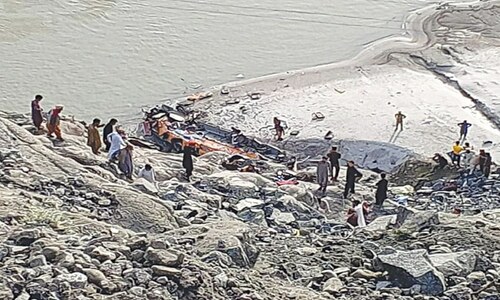 ISLAMABAD, March 8: Pakistan on Thursday became richer in its cultural heritage -- courtesy the international community -- when over three dozen missing artifacts of the Gandhara period were returned to the home country.
ISLAMABAD, March 8: Pakistan on Thursday became richer in its cultural heritage -- courtesy the international community -- when over three dozen missing artifacts of the Gandhara period were returned to the home country.
This is the first time in history that nations, particularly the United States, have helped a country in this region regain its lost archaeological assets.
To date, Pakistan remained a place where hundreds of ancient artifacts were dug and illegally sold into international black markets. And as the international community stepped up to preserve their heritage, some hope was revived that stolen treasures may be returned to their country of origin to plug holes in ancient history.
Among the 38 repatriated artifacts, were Buddhist statues, a rare cup from the second century before the Common Era and a number of sculptures, including a starving Buddha.
Another 10 Gandhara artifacts, smuggled out of Pakistan, have already been sent to Karachi and would be sent to Islamabad within a week.
Celebrating on their successful return the artifacts were put up for exhibition at the Islamabad Museum, Sir Syed Memorial Building. Pieces like frieze depicting Buddha in meditation 2nd -3rd Century AD, Ganesh on a lion 6th to 7th Century AD, and one of the only two statues of Athena (goddess of wisdom) were on display. Of the only two pieces of Athena's impressions in Pakistan, the other piece graces the unique collection of artifacts in the Lahore museum.
"Cultural heritage is no more the heritage of any community, group or nation, but the heritage of the entire world community. It is our individual and collective duty to protect the heritage and never allow cultural objects to be removed from countries of their origin," said the Minister of Culture, Dr G. G. Jamal.
Speaking at the ceremonial return of the priceless objects, the US Ambassador Ryan C. Crocker said that the artifacts displayed were shipped illegally from Pakistan to an international black market in cultural artifacts. They were seized and recovered by agents of the United States Department of Homeland Security in the port of Newark in September, 2005.
“It is a sign of maturity, respect and cooperation in our law enforcement relationship. It is an important sign of our true respect for the profound cultural heritage of Pakistan,” the Ambassador said.
Pakistani archaeologists believed that there were thousands of sites that still needed to be excavated. Because the majority were situated in difficult mountainous terrains; some 5,000 metres high were almost impossible to protect from foreigners involved in making money or satisfying their personal whims and from locals who had no regard for their own national pride.
Director of Antiquities, Dr Mohammad Ashraf Khan, Sorbonne, Paris, said: "Theft and illicit trade in antiquities are some of the most serious concerns of the Archaeology department. Some 1,400 historical artifacts were seized in Karachi in 2006. Customs at Karachi seized another 600 ancient artifacts in the beginning of this year. We are also negotiating the retrieval of about another 600 artifacts, belonging to the Stone Age and mostly to the Islamic Era, were seized in Belgium in 2005. Hopefully they will return the lost treasures to Pakistan."
Dr Khan said there were some 6,000 sites in the Gandhara region of which only 60 to 70 had been excavated. "Thousands are still buried. Some 13 foreign missions are engaged in excavations at some of these sites. The Americans are working in Harappa, the Italians in Swat, the British in Charsada and the Germans are working to save rock art in the north," he said.
Director General, Archaeology and Museums, Dr Fazal Dad Kakar, said: "Gandhara region stretched from Taxila to as far as Jalalabad and Bagram. Illegal exports of precious objects are difficult to protect because Pakistan lacks resources and the manpower."
Gandhara is one of the foundation stones of Pakistan’s historic and cultural heritage. It was a centre of art, a centre of enlightened thought, and a centre of learning from the second century before the Common Era to the fifth century of the Common Era -- something that the Pakistani establishment is beginning to realize and a concept of its preservation is setting in.














































Dear visitor, the comments section is undergoing an overhaul and will return soon.